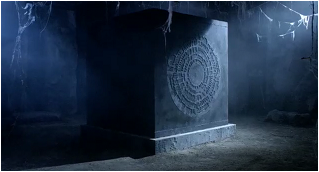 I’ve come to really enjoy Japanese live action drama TV. They do a lot of mystery and police drama, with lots of great twists. One that we watched recently is called Ataru. It’s about a young police woman, Maiko Ebina, who has been the public face of her police department, but hasn’t been happy with her job. She is often written off as a poster girl and not considered a real detective by her fellow officers. She also has a tragic past. Her mother died when she was in high school. The police wrote her accident off as a suicide, a “trash heap” as they call it, where the case appears to be either an accident or suicide, and not worth continual investigation. Because of her mother, Maiko wants to investigate these more and takes an “extended vacation” to find the truth. While at one such scene, she finds a man she things is dead at first, but he just asleep. He calls him himself Chokozai, and gives Maiko several clues that turn out to be key to solving the case, and turning it from a trash heap to a homicide. With no way to identify Mr. Chokozai, Maiko takes him in, and with the help of her superior, Shunichi Sawa, they continue to solve trash heaps, including the truth behind Maiko’s mother’s death.
I’ve come to really enjoy Japanese live action drama TV. They do a lot of mystery and police drama, with lots of great twists. One that we watched recently is called Ataru. It’s about a young police woman, Maiko Ebina, who has been the public face of her police department, but hasn’t been happy with her job. She is often written off as a poster girl and not considered a real detective by her fellow officers. She also has a tragic past. Her mother died when she was in high school. The police wrote her accident off as a suicide, a “trash heap” as they call it, where the case appears to be either an accident or suicide, and not worth continual investigation. Because of her mother, Maiko wants to investigate these more and takes an “extended vacation” to find the truth. While at one such scene, she finds a man she things is dead at first, but he just asleep. He calls him himself Chokozai, and gives Maiko several clues that turn out to be key to solving the case, and turning it from a trash heap to a homicide. With no way to identify Mr. Chokozai, Maiko takes him in, and with the help of her superior, Shunichi Sawa, they continue to solve trash heaps, including the truth behind Maiko’s mother’s death.
Mr. Chokozai is really a man named Ataru. He is autistic with savant abilities; enhanced memory and an ability to make connections. He has been living in the United States for the last 25 years training with the FBI to be a crime scene investigator. He doesn’t communicate well, and gives cryptic clues that have to be interpreted. He is brought back to Japan to test his skills in a real world environment. Maiko is the first person he meets, and he sort of imprints on her, as she takes him in. Being autistic, Ataru has some particular habits. He doesn’t like his schedule to be interupted or changed. He has curry soup in the morning, a hot dog (with lettuce) for lunch, and ketchup and mustard for dinner. He also has to watch his favorite TV show, Synchronized Swimming Detective. Most of the time Ataru is quiet and gentle, but he can become violent when his routine is disrupted, though it is mostly just slapping.
 Having an autistic detective is very unusual to say the least, but Ataru really pulls it off, mostly because of its lead actor, Masahiro Nakai. He does a phenomenal job of playing Ataru, and if very convincing in the part. I would love to see the outtakes and bloopers from the show, if there were any. He finds ways to show Ataru’s emotions with the simplest of looks or gestures. Without Nakai’s acting, this would never have worked. Maiko Ebina, the female lead does a great job handling Ataru as well. She comes off very motherly toward him, and has incredible patience to deal with his peculiar habits. She isn’t too swift, and doesn’t get a lot of Ataru’s clues, but she has the passion to see the case through, no matter what the conclusion is. Her superior, Shunichi Sawa, comes off as rather unreliable, as he can’t walk by a mirror or reflective surface without checking his reflection. He also seems rather wishy-washy when it comes to their boss, Nakatsugawa, but under this facade there does appear to be a reliable detective. He is truly concerned for Ataru’s health as the case seem to start to wear on him, and he even starts to see that relegating a case to a “trash heap” quickly might be a mistake in procedure.
Having an autistic detective is very unusual to say the least, but Ataru really pulls it off, mostly because of its lead actor, Masahiro Nakai. He does a phenomenal job of playing Ataru, and if very convincing in the part. I would love to see the outtakes and bloopers from the show, if there were any. He finds ways to show Ataru’s emotions with the simplest of looks or gestures. Without Nakai’s acting, this would never have worked. Maiko Ebina, the female lead does a great job handling Ataru as well. She comes off very motherly toward him, and has incredible patience to deal with his peculiar habits. She isn’t too swift, and doesn’t get a lot of Ataru’s clues, but she has the passion to see the case through, no matter what the conclusion is. Her superior, Shunichi Sawa, comes off as rather unreliable, as he can’t walk by a mirror or reflective surface without checking his reflection. He also seems rather wishy-washy when it comes to their boss, Nakatsugawa, but under this facade there does appear to be a reliable detective. He is truly concerned for Ataru’s health as the case seem to start to wear on him, and he even starts to see that relegating a case to a “trash heap” quickly might be a mistake in procedure.
Just as quirky is the supporting cast. Reiji Atsumi works in forensics. He has four children, with a fifth on the way, a fact he is very proud of. He and Sawa are long time friends. He also has the annoying habit of holding evidence out of reach of Sawa and Maiko when he’s showing it to them. Hasou Nozaki is another detective under Sawa, and treats Maiko with scorn, calling her the “poster girl” and writing off cases as trash heaps almost immediately. He slowly starts to change after seeing Maiko and Ataru work together to reveal the truth.
 The cases are all well conceived, and the answer is never obvious. Since the cases all appear to be accidents or suicide at the beginning, there is never a hint of villain, but for the most part, the cases turn out to be homicides. All except for Maiko’s mother’s case, which takes quick a roller coaster ride before the solution is finally presented. Throughout the series, there is a subplot about the mystery of Ataru’s identity, which gets another of Sawa’s friends, Koshiro Inukai into some trouble, which also send Sawa on a collison course with Larry Inoue, the FBI agent in charge of Ataru.
The cases are all well conceived, and the answer is never obvious. Since the cases all appear to be accidents or suicide at the beginning, there is never a hint of villain, but for the most part, the cases turn out to be homicides. All except for Maiko’s mother’s case, which takes quick a roller coaster ride before the solution is finally presented. Throughout the series, there is a subplot about the mystery of Ataru’s identity, which gets another of Sawa’s friends, Koshiro Inukai into some trouble, which also send Sawa on a collison course with Larry Inoue, the FBI agent in charge of Ataru.
One of the things I love about Jdramas is how they can balance their mysteries with the characters personal lives. In every episode, we always see Maiko’s family sitting down to dinner, with Ataru and Sawa often joining them, especially in later episodes. And one episode is dedicated completely to Ataru reuniting with his parents. It was so touching to see the wrong impression his mother has had for the 25 years get dispelled. I teared up. I usually do with most Jdramas. That’s how well they craft the story and characters. You really care about them by the end, and really don’t want them to go.
I really enjoyed Ataru. It was fun and quirky, and helped fill the gap of good mysteries on TV. So many TV shows have gone toward police procedurals, which are okay, but I miss a lot of the plain, old mysteries, with a detective just solving the crimes. I’m grateful to my husband, who usually finds these quirky shows and even watches them with me. And even sometimes, likes them too. You can watch Ataru online at Dramacrazy.net. I would highly recommend it.


